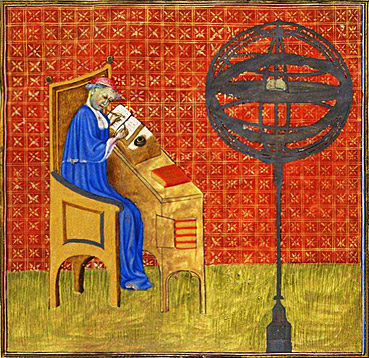 |
| Nicholas Oresme |
For most scholars of the Classical and early Medieval eras, the Earth was fixed, and the Heavens rotated around the Earth once each day. Buridan didn't like this: the Heavens are so much larger than the Earth; why would God design such an inelegant system? Moving the Earth would be easier.
Ptolemy knew this could not be, because if the Earth were rotating, there would be a constant rushing of wind as the air of the atmosphere passed over the land underneath it. Buridan scoffed at this: the atmosphere would be rotating just as the land does. There was no reason to dismiss the idea that Earth rotated daily.
For Buridan, however, empirical evidence was crucial. Of course, his predecessors argued, the Earth clearly does not move; we can see that. Buridan, however, likened the situation to being in a boat on a river. An observer on a second boat that was tied to the bank would see the first boat moving, but if the observer on the second boat could not see the surrounding landscape, then he would not know which of the boats were moving. The problem, Buridan knew, was that without an outside frame of reference, one cannot tell if it is the Earth or the Heavens that is moving. He needed an experiment, and he thought of one.
...and that's when he made his mistake.
Here was his idea: shoot an arrow straight up above your head. If it comes back down where you are standing, then the Earth is stationary. If the Earth rotated under it, then the arrow would come down somewhere off to the side.
He didn't realize that the same property that moves the atmosphere along with the ground would carry the arrow along as well. It would be Buridan's most brilliant student, Nicholas Oresme (c.1325-1382), who would realize and state that the arrow moves along with the Earth and atmosphere. Lacking a way to definitively prove his ideas, however, Oresme would ultimately fall back on the Bible for guidance on this issue.